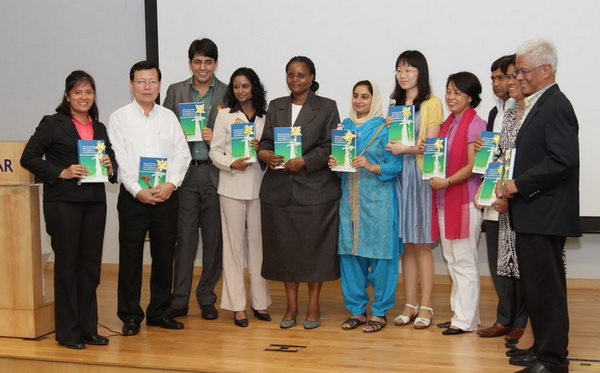
Experts Share Lessons on Communicating Biotechnology
April 15, 2011| |
Asia and the Pacific are expected to spearhead the global market for crop biotechnology. Four countries in Asia and the Pacific-Australia, China, India, and the Philippines are mega biotech countries or those that grew 50,000 hectares or more of biotech crops. These countries take the lead in sharing their experiences in communicating biotechnology in a book Communication Challenges and Convergence in Crop Biotechnology edited by Drs. Mariechel J. Navarro and Randy A. Hautea of the International Service for the Acquisition of Agri-biotech Applications (ISAAA). The book was launched at Biopolis, Singapore on April 6, 2011 during a Public Forum on Science Communication.

Science communication initiatives of countries such as Philippines, China, Australia,Thailand, India, Malaysia, Bangladesh, and Vietnam as well as the Organization of Islamic Conference countries and CropLife Asia are discussed in the 13 chapter, 310 page book.
The authors say that the book presents case studies that offer unique and rich examples of how countries have been able to guide through the 'drama' of crop biotechnology as they shepherd innovations from the laboratory, greenhouse trials, multi-location trials, and hopefully to farmers' fields. "Each country is making its own contribution, and together they converge to form a consensus on crop biotechnology," they added. Lessons learned from counter experiences will hopefully contribute to a better appreciation and understanding of the crucial role of science communication in the laboratory to farmer's field continuum.
The case studies show that despite diversity in culture, political set-up, economic development, religious beliefs, and language, countries have been able to address specific issues that impede or hasten the development of crop biotechnology. "An appreciation of science communication and appropriate strategies have led to a better understanding of the societal environment where the technology can best thrive," the authors conclude.
For more information about the book, email knowledge.center@isaaa.org.
| |
Biotech Updates is a weekly newsletter of ISAAA, a not-for-profit organization. It is distributed for free to over 22,000 subscribers worldwide to inform them about the key developments in biosciences, especially in biotechnology. Your support will help us in our mission to feed the world with knowledge. You can help by donating as little as $10.
-
See more articles:
-
News from Around the World
- Sustainable, Profitable and Productive Agriculture Continues to be Boosted by the Contribution of Biotech Crops
- Experts Share Lessons on Communicating Biotechnology
- New Golden Rice Partners Join Forces Against Vitamin A Deficiency
- Biosciences Key to Africa Feeding Itself, said Calestous Juma
- BC Plus Receives Grant to Fight Malnutrition in the Developing World
- USDA Agro-research Czar Advocates Agricultural Technologies
- New Pest Monitoring Website by ISU Simplifies Management of Crop Pests
- Application for Non-regulated Status of GM Roses at US Federal Register
- USDA Grants Support Sustainable Bioenergy Production
- Drought –Exposed Leaves Adversely Affect Soil Nutrients, Study Shows
- Combating Global Fungi Disease that Threatens Food Supply and Forests
- Special Edition of M&M'S® with Sub1 gene
- BRRI Releases Two New Stress-Tolerant Rice Varieties
- Genetically Modified Products Regulated in Vietnam
- Hanoi Hosts Science Meeting with Asian Theme
- Vietnam, Cuba Enhance Science, Agriculture Cooperation
- Irish Farmers' Association President Acknowledge Benefits of GM Technology
- Spanish Farmers Demand More Available GM Crops
-
Research Highlights
- Scientists Conduct Woodlouse Feeding Experiment with Biotech Wheat
- Effect of Herbicide-tolerant Corn on the Abundance of Field Bugs in Spain
- Field Testing and Use of GM Cassava with Low Amylose Starch in Indonesia
-
Beyond Crop Biotech
- GM Cows Produce "Human" Milk
- TAL Effector Nucleases, a New Genetic Tool for Plant and Human Targets
-
Announcements
- Biotech Crops Cartoon 'Mandy & Fanny' Goes Online
-
Resources
- Why Genetically Modified Crops?
- Minireview: Biotechnological Approaches for Sesame and Niger
- USDA-FAS GAIN Report on Biotechnology in the People's Republic of China
- Book Addresses Changing Climate's Influence on Weeds
-
Read the latest: - Biotech Updates (February 11, 2026)
- Gene Editing Supplement (January 28, 2026)
- Gene Drive Supplement (February 22, 2023)
-
Subscribe to BU: - Share
- Tweet
